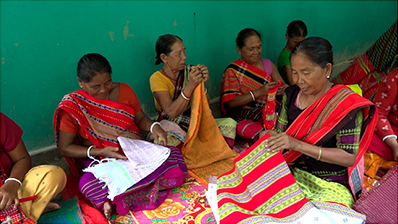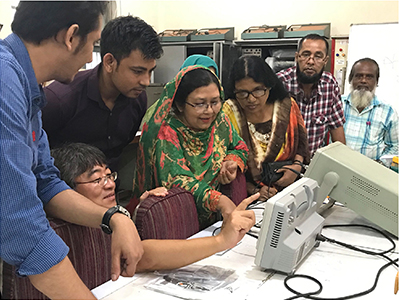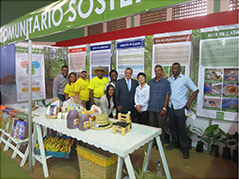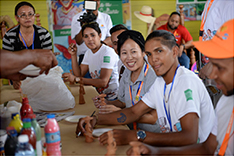(4) Vocational Training, Industrial Human Resources Development, and Employment Creation
For quality growth, it is essential to acquire vocational skills, obtain stable employment, and increase income. In developing countries, however, opportunities to receive education and training are limited, which poses a major obstacle to industrial development in those countries.
Moreover, in order to create stable employment under the uncertain global employment situation, each country must urgently prepare for risks by building social safety nets, Note 29 as well as engage in an international effort to realize decent work, stipulated in SDG 8.
● Japan’s Efforts
■ Vocational Training and Industrial Human Resources Development

Members of a self-help group in Tripura state in India, working on sewing as part of livelihood development activities (Photo: Tripura Forest Department)
With the aim of assisting developing countries in fostering human resources who have diverse technology and technical skills, Japan provides support to leading polytechnic and vocational training schools, which will serve as core centers in each country. In implementing this assistance, Japan utilizes its insight and know-how in cooperation with the private sector. Japan supports the capacity building of teachers and trainers, the reinforcement of the operational capacity of training schools, and the development and revision of curriculums and teaching materials, in order to further strengthen the linkages between education and employment.
Between 2016 and 2022, Japan, in collaboration with the industrial sector, provided comprehensive assistance including facility and equipment improvement to 19 Technical and Vocational Education and Training (TVET) institutions through 13 projects in nine countries. In 2021, Japan also contributed to skill development through 21 projects in 59 countries and regions, with the aim of improving the livelihoods of women, persons with disabilities, demobilized soldiers, and refugees and those whose lives had been affected by conflicts.
In Asia, with a view toward the 50th Year of ASEAN-Japan Friendship and Cooperation in 2023, Japan has implemented the “Industrial Human Resource Development Cooperation Initiative 2.0,” Note 30 which aims to support industrial human resources development of approximately 80,000 people in Asia over five years from 2018. In this initiative, Japan has steadily implemented human resources development in cooperative fields for industrial advancement capabilities, including in AI and other digital fields, in addition to the previously focused cooperation in practical technology, design and development capabilities, innovation, business administration, planning, and management capabilities.
The “Innovative Asia” Initiative, which has been implemented since FY2017, also provides excellent science and technology students from developing countries in Asia with opportunities to study abroad and intern at companies in Japan to promote the circulation of highly-skilled human resources between Japan and other Asian countries.
Moreover, the Ministry of Health, Labour and Welfare (MHLW) conducts training both in Japan and in targeted countries of Cambodia, Indonesia, and Viet Nam. The training Note 31 is designed to transfer the know-how of Japan’s skills evaluation system accumulated in the government and the private sector (Japan’s National Trade Skill Test and Certification and skills competitions) to those in targeted countries in order to develop and secure a quality workforce. In FY2021, a total of 211 people from three countries participated in these training programs. The training is expected to develop and improve skills evaluation systems in these countries, which in turn will promote the development of their skilled workers and elevate their social standing through increased employment opportunities.
In the African region, Japan has supported the development of industrial human resources for the sustainable growth of each individual, through the ABE Initiative (African Business Education Initiative for Youth) Glossary and the Kaizen Note 32 Initiative, which are driven by industry-academia-government collaboration, as well as technical assistance in partnership with international organizations. The ABE Initiative had provided training opportunities to approximately 2,000 people by December 2022 (see “Project Introduction Columns” on Malaysia and Tunisia for Kaizen Initiatives). At TICAD 8 held in August, Japan announced its intention to help develop human resources in fields such as industry, health, medicine, education, agriculture, justice, and administration that would support the future of Africa. In addition, Japan has set up Project NINJA (Next Innovation with Japan) Note 33 to support startup ecosystems in developing countries and provides assistance for identifying issues faced by entrepreneurs, policy recommendations, capacity building of corporate management, promoting cooperation among entrepreneurs, business matching between entrepreneurs in developing countries and Japanese companies, and promoting investment, in collaboration with various stakeholders.
■ Employment, Including Job Creation

Preparing for instructor training in the technical cooperation “Project for Improvement of Technical Education for Industrial Human Resources Development,” in Bangladesh (Photo: JICA)
Japan also provides assistance in the area of labor issues. The COVID-19 pandemic and Russia’s aggression against Ukraine have had major socio-economic impacts on various countries, and the impact has been particularly severe on socially vulnerable people including youth and women. In light of this, there is a strong international need for support and response to realize decent work for all workers. Japan provides technical cooperation mainly in the Asian region to improve standards of occupational safety and health and social insurance systems, through contributions to the ILO, among others. In addition, Japan contributes to employment support for youth in Africa Note 34 as efforts to realize decent work.
Dominican Republic
Local Community-led Tourism Development
Project for Enhancing the Mechanism for Sustainable Community Based Tourism Development in the North Region
Technical Cooperation Project (April 2016 – March 2022)
In the Dominican Republic, one of the most popular tourist destinations in the Caribbean, large-scale development projects with foreign capital have been actively implemented to date. Such large-scale development, however, did not properly utilize the natural and cultural resources of the surrounding area, and opportunities for local residents to benefit were also limited.
Japan, therefore, provides assistance for Community-Based Tourism (CBT) promoted and led by local communities, which the Government of the Dominican Republic advocates, and supports sustainable tourism development that leads to regional development.
This project aimed to create employment and revitalize the regions through the promotion of local specialty products, targeting the 14 northern prefectures. To achieve this, Japan helped develop new tourism products such as experience-based tourism that emphasizes the experience of enjoying the culture and nature unique to the region. Japan further supported planning tourism routes to attract tourists to rural areas and developing human resources related to marketing.
As a result, the project succeeded in creating new tourism demand that utilized local resources, such as adventure experiences including kayaking and rock climbing, and workshops for making folk crafts. Community-led tourism activities bring benefits to areas that were previously left out of tourism development.
In addition, as COVID-19 countermeasures, Japan provided assistance for formulating infection prevention guidelines and protective equipment against infectious diseases so that CBT could continue amid the pandemic. Furthermore, in cooperation with the World Tourism Organization (UNWTO), Japan also supported the formulation of a post-COVID-19 recovery plan, whose results were reflected in the Government of the Dominican Republic’s Strategic Vision 2030 for CBT Promotion.
Japan will continue to support sustainable tourism development in which local communities play an active role.

A JICA expert introducing experience-based programs and local products that utilize local resources at a regional exposition (Photo: JICA)

A Japan Overseas Cooperation Volunteer (JOCV) giving instructions during a folk craft workshop at a regional exposition (Photo: JICA)
Glossary
- Science and Technology Research Partnership for Sustainable Development (SATREPS) program
- Through the collaboration of Japan’s advanced science and technology and ODA, SATREPS aims to resolve global issues in the fields of environment and energy, bioresources, disaster prevention and mitigation, and infectious disease control. Under this program, research institutes both in developing countries and Japan work together to conduct international joint research with the following objectives: (i) enhancing international cooperation in science and technology, (ii) acquiring new knowledge and technologies that lead to the resolution of global issues, and through this process, creating innovations (iii) promoting capacity development. The Ministry of Foreign Affairs (MOFA) and JICA, in collaboration with the Ministry of Education, Culture, Sports, Science and Technology (MEXT), the Japan Science and Technology Agency (JST), and the Japan Agency for Medical Research and Development (AMED), provide support to research institutes and researchers in Japan and the developing countries.
- African Business Education Initiative for Youth (ABE Initiative)
- This program aims to promote human resources development for business and industry in Africa, and to foster “navigators” who support the business activities of Japanese companies in Africa. Continuously carried out since its launch at TICAD V in 2013, the program has provided youth from Africa with opportunities to pursue master’s degrees at Japanese universities, as well as business programs such as internships at Japanese companies, Japanese language training, and business skills training.
- Note 29: Mechanisms in which people can live in safety and without difficulties.
- Note 30: The “Industrial Human Resource Development Cooperation Initiative,” which was announced at the ASEAN-Japan Summit Meeting in 2015, was achieved and far exceeded the original goal of assisting industrial human resources development of 40,000 people over three years. Following this, Japan announced the “Industrial Human Resource Development Cooperation Initiative 2.0” at the ASEAN-Japan Summit Meeting in 2018.
- Note 31: The types of training include “Training for people in charge of writing test standards and test questions, etc.,” and “Training for people in charge of testing and grading, etc.” The number of participants above is the total for all types of training.
- Note 32: An approach in which each worker at a production site comes up with and implements their own ideas on how to eliminate inefficiency in the production process and improve quality and productivity. In Japan, in the period of rapid growth after WWII, this approach was cultivated on the job by the manufacturing industry to increase quality and productivity, and is based on 5S: “Sort, Set, Shine, Standardize, and Sustain.”
- Note 33: Entrepreneur support activities aimed at creating business innovation in developing countries, which were launched by JICA in January 2020.
- Note 34: Ethiopia, Gambia, Madagascar, Mauritania, Mozambique, and Sudan.
